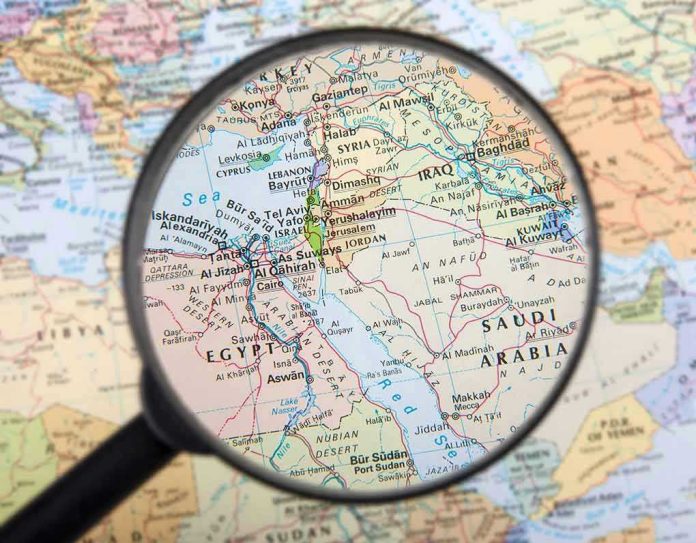
Israel’s warning that only an Arab-led ground force can finally eliminate Yemen’s Houthis sets the stage for a Middle Eastern showdown that most of Washington’s elite and their media echo chambers would rather ignore—because it exposes just how feckless years of “diplomatic engagement” have been.
At a Glance
- Senior Israeli officials declare airstrikes alone cannot stop the Houthi threat; a regional ground force is now deemed necessary.
- Iran-backed Houthi militants have escalated missile and drone attacks on Israel and international shipping.
- Arab states remain wary of military intervention after years of inconclusive, costly fighting in Yemen.
- The Biden administration’s withdrawal from the Saudi coalition and focus on diplomacy left a vacuum exploited by Iranian proxies.
Israeli Leaders Say It Out Loud: Airstrikes Are Not Enough
Senior Israeli officials have finally said what everyone else tiptoes around: endless airstrikes are not solving the Houthi problem. Instead, they argue only a boots-on-the-ground campaign—led by Arab states—can root out the Iranian-backed militants in Yemen. This isn’t a call for reckless adventurism. It’s a recognition that the status quo, fueled by years of Western “strategic patience,” has allowed the Houthis to grow from a local nuisance into a regional menace capable of launching missiles 2,000 kilometers to threaten Tel Aviv and disrupt global shipping lanes. Israeli jets have pounded Houthi targets across Yemen—ports, power stations, suspected weapons depots. Yet the missiles keep coming. The Israeli military, constrained by distance and regional realities, knows it can’t send its own troops, so it’s looking to so-called “friendly” Arab regimes for help. And that’s where the farce of international diplomacy comes in.
Arab governments know from bitter experience—the Saudi-led coalition’s ground campaign from 2015 to 2021 was a disaster. It failed to defeat the Houthis, created a humanitarian catastrophe, and cost billions. Yet as the Iranian regime arms its proxies with ever more sophisticated weaponry, the price of inaction climbs. The Biden administration’s retreat from the region, all in the name of “human rights” and reviving the Iran nuclear deal, left a vacuum. Predictably, Tehran’s militants filled it. Now, rather than face the reality of what appeasement has wrought, Washington’s experts wring their hands about “regional escalation” and call for more talks.
The Houthis: Iran’s Hand in Yemen, the World Pays the Price
Let’s call it what it is: the Houthis aren’t some plucky underdogs. They’re Iran’s proxy army, supplied with missiles, drones, and training. Their attacks have forced commercial vessels to flee the Red Sea, jacking up shipping costs and threatening global supply chains—something the Biden crowd in D.C. prefers to blame on “market forces” rather than on their own foreign policy blunders. When a Houthi missile slammed near Ben Gurion Airport in May, the IDF responded with airstrikes on Yemeni ports and infrastructure. But the facts are clear: the Houthis are resilient. They keep firing. Their stockpiles are dented, not destroyed. And every time the West hesitates, Tehran and its clients get bolder.
Arab states, especially Saudi Arabia and the UAE, have every reason to fear getting bogged down again. The Saudis remember the years of casualties, the international finger-wagging, and the cold shoulder from Washington once the political winds shifted. But ignoring the Houthi threat only emboldens Iran and deepens the region’s instability. The international shipping industry, squeezed by higher insurance rates and rerouted vessels, is paying the price for the West’s strategic incoherence. Yemen’s civilians, caught between airstrikes and Houthi repression, are suffering through one of the world’s worst humanitarian crises. The supposed guardians of “international order” are nowhere to be found.
Arab-Led Ground Force: Real Solution or Pipe Dream?
Israeli officials are right about one thing: only a ground campaign can finish the job. But let’s not kid ourselves—there’s little appetite among Arab states to rush back into Yemen’s quagmire, especially with the U.S. and Europe missing in action or cheering from the sidelines. Without a robust, multinational Arab force—and, let’s be honest, Western logistical support—there is no chance of dislodging the Houthis. The alternative? Let Iran’s proxies keep launching missiles at Tel Aviv and holding the global economy hostage. That’s the “solution” offered by the same elites who told us endless appeasement would bring peace.
For the millions of Yemenis trapped in misery, and for every Israeli parent listening for air-raid sirens, the cost of delay is measured in lives, not press releases. The longer the world dithers, the more dangerous this situation becomes—not just for the Middle East, but for anyone who relies on the free flow of commerce through the Red Sea. And as usual, it’s the American taxpayer and the global middle class who end up footing the bill for elite incompetence.
Sources:
Israeli attacks on Yemen (May 2025–present) – Wikipedia
IDF downs Houthi missile from Yemen – JNS
2025 Houthi attack on Tel Aviv airport – Wikipedia














